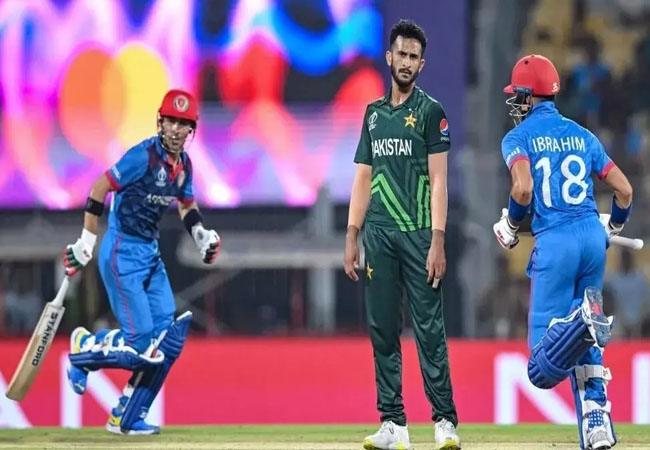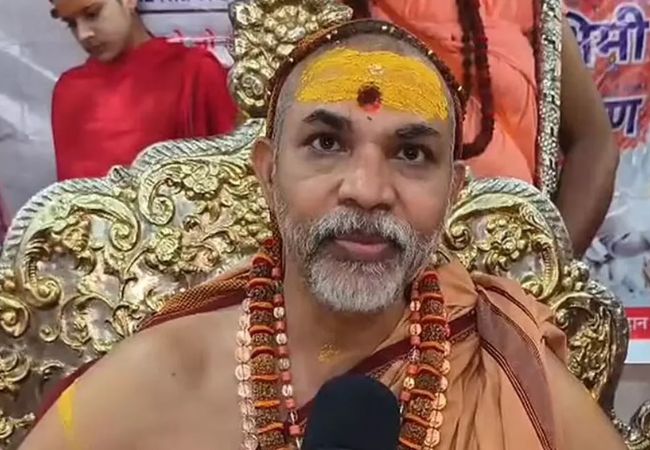Chennai (PTI): A spirited Afghanistan team continued its giant-killing spree to literally push Pakistan on the brink of elimination with a eight-wicket victory in a World Cup game on Monday.
On a challenging Chepauk track, a target of 283 was certainly not the easiest of chases but Kolkata Knight Riders' Rahmanullah Gurbaz (65 off 53 balls) teed off in style while his partner Ibrahim Zadran (87 off 113 balls) dropped anchor at the other end in an opening stand of 130 which laid the perfect platform.
While experience is worth its weight in gold in these kind of games, Afghanistan did well enough to chase down the target in 49 overs, exposing the frailties of Pakistan bowling unit which just didn't turn up on the day.
Having lost seven ODIs against Pakistan, Afghanistan was missing out on that finishing touches which was required and all the four batters did play their parts to perfection in what was their highest run-chase in history of 50 over format.
This is Afghanistan's second win after beating defending champions England in New Delhi and with four points are now placed sixth in mid-table muddle.
Pakistan, for time being, stay put on fifth place but after a hat-trick of defeats, another loss against South Africa later this week, will in all likelihood shut the knock-out doors for the 1992 champions.
Seasoned Rahmat Shah (77 not out off 84 balls), whose straight six down the ground off Hasan Ali was a visual treat, showed admirable situational awareness even as Pakistan bowlers did put pressure on him during the second phase of the chase. He repeated the same shot off the same bowler to put Afghanistan within sniffing distance of victory.
He got good support from skipper Hashmatullah Shahidi (48 not out, 45 balls), who reverse swept an off-colour Shadab Khan against the turn during crucial juncture which spoke volumes about his temperament. The duo added 96 runs for the third wicket in some of the most difficult batting conditions. The sense of happiness and elation after hitting the winning boundary was there for everyone to see.
The 21,000 odd sporting crowd at Chepauk also gave the team a nice standing ovation.
The match that was played on the same track as the India versus Australia game had both grip and turn on offer but 282 for 7 by Pakistan was by no means a poor effort if one takes quality spin bowling unit that Afghanistan possesses.
If spin is Afghanistan's strength, it is certainly Pakistan's biggest weakness as bowlers of Shadab (0/49 in 8 overs) and Usama Mir (0/55 in 8 overs)'s quality don't win World Cups.
In Indian domestic cricket, there are better wrist spinners than these two and one of the best in the world, Yuzvendra Chahal hasn't got a look-in in this Indian team.
When Afghanistan started chase, Gurbaz, who hit nine fours and a six, wasn't overawed by Shaheen Shah Afridi, Hasan or Haris Rauf.
The Pakistanis bowled too many boundaries in the first 15 overs as Gurbaz took the likes of Rauf and leg-spinner Usama Mir to the cleaners and also hit off-spinner Iftikhar Ahmed for his only six.
Strong on the off-side, Gurbaz repeatedly peppered the point and backward point region as Pakistani bowlers bowled short and wide outside the off-stump.
In one Rauf over, eighth of the innings, Gurbaz got four boundaries and save the last one, which was a streaky inside edge, three were cuts or slashes through point region.
Pakistan's fielding was rubbish to say the least as most fielders tried putting blame on others in full public view, including skipper Babar Azam, who lost his cool after failing to stop overthrows.
Earlier Babar struck a composed half-century before useful cameos by lower-order batters guided Pakistan to a reasonably good total if one takes the track into account.
Opener Abdullah Shafique made 58 off 75 balls and Babar got 74 off 92 balls, but had it not been for the efforts of Iftikhar Ahmed and the returning Shadab Khan, Pakistan would have finished with far less than what they eventually achieved.
While Iftikhar smashed his way to a 27-ball 40, Shadab contributed a breezy 40 in 38 deliveries.
Expecting a slow pitch, the Afghans moved in with four spinners. However, the track turned out to be better than expected.
The Pakistani openers Shafique and Imam-ul-Haq (17) began on a cautious note and managed a 56-run stand.
While they brought up the side's 50 by the eighth over, Shafique was targeting pacer Naveen-ul-Haq.
Also, spinner Mujeeb Ur Rahman was expensive in the first 10 overs of the powerplay.
The first delivery of the second powerplay saw the Afghans earn the first breakthrough, with Imam falling to speedster Azmatullah Omarzai off a short ball.
Nevertheless, the Men in Green barely panicked as Shafique joined forces with skipper Babar and put up a 54-run partnership for the second wicket.
At this point, spinners Mohammad Nabi and Rashid Kahn operated in tandem to keep things under control, not allowing the two batters in the middle to free their arms.
In the meantime, Shafique brought up his third ODI half-century, while Babar looked to mix aggression with caution.
Let the Truth be known. If you read VB and like VB, please be a VB Supporter and Help us deliver the Truth to one and all.
Lucknow (PTI): The Uttar Pradesh Congress on Wednesday staged a statewide protest demanding a fair and transparent inquiry into the FIR lodged against Swami Avimukteshwaranand Saraswati and those who filed the complaint against him.
In a statement issued here, the party said memorandums addressed to Prime Minister Narendra Modi were submitted through district magistrates in all districts of the state.
Uttar Pradesh Congress spokesperson Manish Hindvi told PTI that the memorandums were handed over through the district administration in all 75 districts.
In the memorandum, the party alleged that Saraswati and his disciples were "unnecessarily harassed and humiliated" by police on the occasion of Amavasya and were prevented from taking a ritual bath (at the Magh Mela). It further alleged that some disciples were manhandled and taken to a police station.
The memorandum also claimed that an FIR was later registered against Saraswati, his disciple Swami Mukundanand Brahmachari and several unidentified persons in a sexual harassment case. It termed the case a "conspiracy" aimed at tarnishing the seer's reputation.
Citing Articles 25 and 26 of the Constitution, the memorandum stated that these provisions guarantee religious freedom and the right of religious denominations to manage their own affairs.
It described the position of shankaracharya held by Saraswati as "one of the highest spiritual posts in Sanatan tradition" and alleged that the entire episode appeared to have been "orchestrated in a planned manner".
"We request that the background of the persons who got the FIR registered be investigated in a transparent manner by a retired high court judge and strict action be taken against them," the memorandum said.
It also sought a "fair and transparent probe" into the allegations levelled against Saraswati so that the truth could be established.
Earlier, Uttar Pradesh Congress president Ajay Rai had told reporters in Varanasi after meeting Saraswati that the party stood firmly with him.
The Congress said it would continue to press for an impartial inquiry into the entire episode.
On February 21, an FIR was lodged in Prayagraj against Saraswati and his disciple Mukundanand Brahmachari on charges of sexually abusing two persons, including a minor, over the past year at a gurukul and religious congregations, including the recently concluded Magh Mela.
Days after he was booked, Saraswati had said on Monday that he would not oppose his arrest and asserted that the "fabricated story" would be exposed sooner or later.
At a press conference on Wednesday, Saraswati alleged that criminals rule in Uttar Pradesh, level allegations and influence investigations, as he denied having any contact with the two persons for whose alleged sexual abuse he has been booked.



_vb_77.jpeg)
_vb_00.jpeg)
